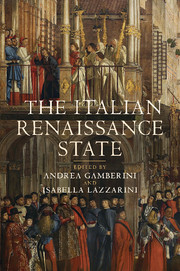Book contents
- Frontmatter
- Contents
- Notes on the contributors
- Note on translations and usage
- Map
- Introduction
- Part I The Italian states
- Part II Themes and perspectives
- 12 The collapse of city-states and the role of urban centres in the new political geography of Renaissance Italy
- 13 The rural communities
- 14 Lordships, fiefs and ‘small states’
- 15 Factions and parties: problems and perspectives
- 16 States, orders and social distinction
- 17 Women and the state
- 18 Offices and officials
- 19 Public written records
- 20 The language of politics and the process of state-building: approaches and interpretations
- 21 Renaissance diplomacy
- 22 Regional states and economic development
- 23 The papacy and the Italian states
- 24 Justice
- Bibliography
- Index
12 - The collapse of city-states and the role of urban centres in the new political geography of Renaissance Italy
Published online by Cambridge University Press: 05 August 2012
- Frontmatter
- Contents
- Notes on the contributors
- Note on translations and usage
- Map
- Introduction
- Part I The Italian states
- Part II Themes and perspectives
- 12 The collapse of city-states and the role of urban centres in the new political geography of Renaissance Italy
- 13 The rural communities
- 14 Lordships, fiefs and ‘small states’
- 15 Factions and parties: problems and perspectives
- 16 States, orders and social distinction
- 17 Women and the state
- 18 Offices and officials
- 19 Public written records
- 20 The language of politics and the process of state-building: approaches and interpretations
- 21 Renaissance diplomacy
- 22 Regional states and economic development
- 23 The papacy and the Italian states
- 24 Justice
- Bibliography
- Index
Summary
Introduction
Innumerable aspects of fourteenth- and fifteenth-century Italian cities and city-states have been studied recently. Research has focused on political and institutional contexts, fiscal systems and normative structures, but also on political discourses (both those of the cities as collective actors and those of their internal components), the forms of production of documentary evidence, factions and their presence or absence in different urban contexts and so on. Justice, both its forms and procedures and the effects of these on social and political dynamics, has been investigated too, as have practices and forms of relationship between social and political actors in the cities (and between urban and countryside actors); and individual social groups – the elites, the poor, Jewish communities, clergymen, monks. Research into urban identities, their construction and representation, has been carried out, by investigating, for example, ideologies and mindsets. Studies have focused on the forms of religious life, especially with investigations of the ‘civic religion’ and on the relationships with both secular and regular local ecclesiastical institutions: on hospitals, for instance, focusing on their distribution in the fourteenth century; on sacred places; on brotherhoods; and on devotional activities and activities of care. Moreover, anti-clericalism and the emergence of both popular and elitist forms of lay sensibility and culture have been investigated. Urban spaces have been studied, both those utilised by the various economic, political and social actors and those imagined and modelled by urban politics; these were considered in the light of their functional values, as well as their underlying ideological values of propaganda, power or struggle for power. The analysis of artistic and literary patronage has gone together with research on moments of collective sociability such as both lay and religious celebrations, festivals and rituals. Finally, more ‘traditional’ themes have been investigated: demographic trends, economic and productive life, the role of corporations and merchants, capital, investments, gains, types of production, consumption and prices. The relationships between social dynamics and political equilibria, or between cities and countryside, have not been overlooked either – thus including issues relating to the management of the territories, to the processes of comitatinanza and their efficacy, or to control over forces outside the cities.
- Type
- Chapter
- Information
- The Italian Renaissance State , pp. 239 - 260Publisher: Cambridge University PressPrint publication year: 2012



